Media and political components to dominate over the rules of law in resonant cases – says Lidia Izovitova.
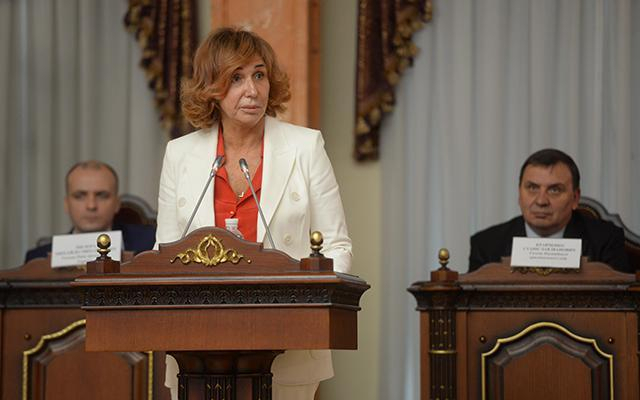
The Head of UNBA, Lidia Izovitova, takes part in the joint sitting of the Council of Judges of Ukraine, the Council of Prosecutors of Ukraine, the UNBA and the Commissioner for European Court of Human Rights.
In her speech, the Head of UNBA has noted the increased violations of the advocates` professional right and guarantee to practice law.
"We sense a permanent increase in pressure on advocates", - says Lidia Izovitova.
According to the UNBA thematic report, provision of the information from the unified registry of pre-trial investigations has violated the advocates’ rights 1,162 times starting from 2013; 75% of which - according to Art. 397 of the Criminal Code, indicates interference with the activities of an advocate; 21% - threat or violence against an advocate. In this case, proceedings are not investigated, and in more than half of the cases are dismissed..
"Since 2013, there have been eight murders of lawyers, and we associate it with their professional activities", - stated the Head of UNBA.
Advocates are subjected to unlawful searches, while investigating judges grant search orders in violation of the rights of advocates as special entities. The data of the Single Register of Advocates of Ukraine is openly accessible, but neither judges nor prosecutors are verifying the registry data in order to establish that, in specific cases, it is a lawyer whose rights and interests are protected by the Constitution and the law.
“Judicial control is far from perfect, since investigating judges often ignore rights of advocates. Neither judges nor prosecutors take their time to make sure what the special entity is”, - stated Lidia Izovitova.
It is common, that advocates are associated with their clients, , and not only in public commentaries or information space. There are proceedings, where an advocate is identified as a member of a criminal group - along with his/her client.
The application of the legislation does not guarantee advocates real observance of their rights.
"When the CPC was adopted in 2012, and the separate article on the rights of advocates was not envisaged, but on the CPC only included advocate’s obligations, we were constantly told that we had had the same rights as a suspect and an accused person, and that this was good as human rights are broader. This was understood by lawmakers, but not by those, who apply this Code. Today it's a problem”, - said Lidia Izovitova.
In addition, it is provided that in one proceeding there can be no more than 5 advocates, while the number of prosecutors is not limited. "The CPC provides that there can be maximum 5 defendants in the court. And how many prosecutors can be there? It is not specified – even the whole prosecutor's office", - commented the Head of UNBA.
The Head of the UNBA stressed that "today representatives of each institution - both advocacy, prosecutor`s office and the judiciary - are exposed to professional risks."
Thedecision of CJU number 45 "On measures to ensure compliance with the principle of equality before the court and the law” was presented for consideration at the joint meeting of participants. The decision concerns the prosecution of a judge of the Kyiv District Court of Poltava for rendering a deliberately unlawful decision.
"The reaction to this judge's decision and subsequent events, namely, the political comments from the General Prosecutor's Office, disinformation of the society, prosecution of the judge by launching criminal proceedings - all this was a logical continuation of the tendency to violate the principles of equality and competition of the parties and the rule of law”, - said the Head of the UNBA.
Although the Constitution provides that judges are independent and governed by the rule of law in their practice, in fact this safeguard does not work:for public, judges are politically divided and belong with either the authorities of the past or the current, while judges do not defend themselves as an independent branch of government.
The Head of the UNBA stressed that advocacy is concerned about such a situation in the judicial system.
"Advocacy needs an independent court for protecting the rights of people", - stated the Head of the UNBA.
However, politicians and state officials give public assessments of court decisions and criminal proceedings contrary to national law, in particular the presumption of innocence, and the practice of the the European Court of Human Rights. The ECtHR’s several decisions consider public statements of state officials to constitute a violation of the ECHR with respect ongoing proceedings, provided that those statements inflame the public to consider the suspect to be guilty and assess the facts and evidence before the court does.
"The media and political components has begun to dominate the rule of law in resonant cases. Its outcome for the justice and the rights of people we protect may be catastrophic”, - said Lidia Izovitova, stressing that public comments of that nature should be held back.
At the same time, that the situation with Judge Antonov is an exception to the rule.
"When on the day of the judgment the authority which administers the URPI, which uploads the information in the URPI, suggests that the judge has already been convicted, it is, firstly, a violation of the presumption of innocence. Secondly, it is a violation of the rule of law and it is a pressure on those judges who are to consider the case in the appeal. This is the pressure on the judge who considersthe case and the pressure on the public”, - said the Head of UNBA.
If this case is to be considered by the ECtHR, the decision that the judge acted under the pressure of public officials will be obvious.
The Head of the UNBA proposed to create a monitoring group from representatives of each of the institutions participating in the joint meeting on the implementation of the Resolution, which will be adopted upon the result of the meeting.
Photo by Evhen Korol
Popular news
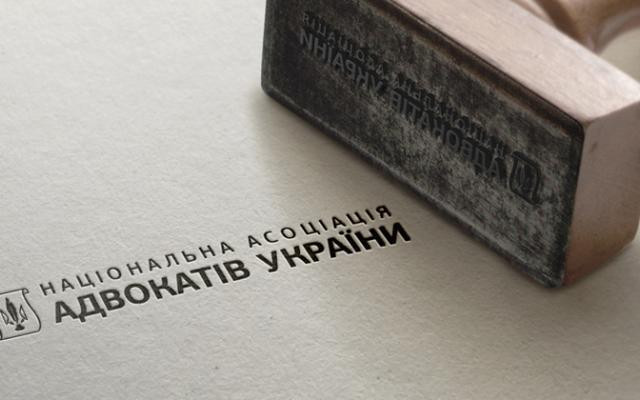
Self-government
The BCU demands a review of the composition of the government working group on reforming the advocacy profession
The President of the UNBA, BCU Lidiya Izovitova, appealed to the Cabinet of Ministers of Ukraine to review the composition of the working group on improving legislation in the field of advocacy and legal practice.

Discussion
Why lowering the age of marriage lacks legal logic
Although until 2012 there was a provision in family law that allowed children to marry from the age of 14 under certain circumstances, its return to Ukrainian law would contradict international obligations and the logic of criminal law.
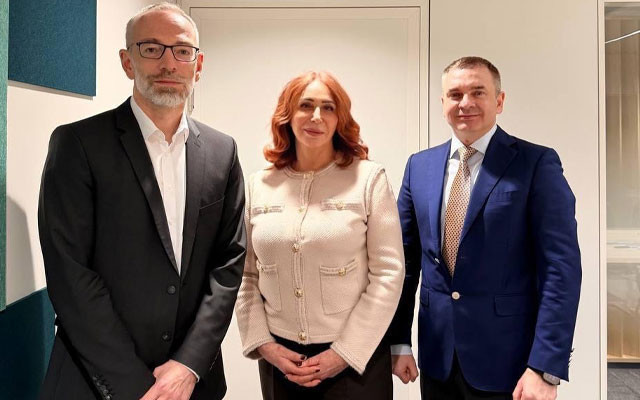
European integration
Open dialogue between the UNBA and the European Commission on the path to EU
The Ukrainian National Bar Association held a working meeting in Brussels with Mr Wolfgang Nozar, Head of Unit for Governance, Rule of Law and Financial Assistance, Directorate-General for Enlargement and Eastern Neighbourhood (DG ENEST), European Commission.

Self-government
A report on Ukrainian advocacy was presented in the European Parliament
Can a shadow report on advocacy replace the political framework of the Roadmap on the rule of law with demands for the restructuring of self-government? Where is the line between accountability and the seizure of institutions? And how can we respond to narratives with data rather than impressions?
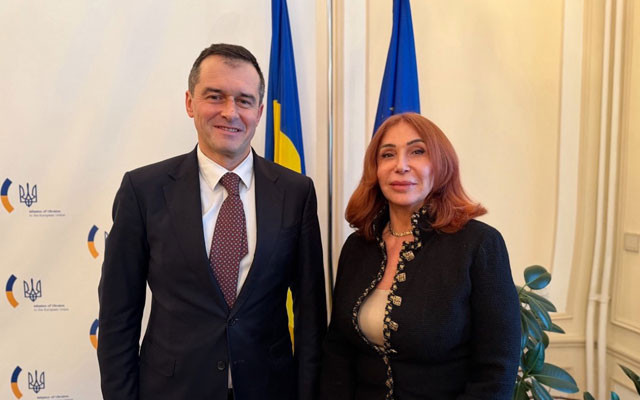
European integration
UNBA and Ukraine's representation to the EU have synchronized their priorities
On February 5, in Brussels, the President of the UNBA, BCU Lidiya Izovitova held a working meeting with the Ambassador Extraordinary and Plenipotentiary of Ukraine, Representative of Ukraine to the European Union Vsevolod Chentsov.
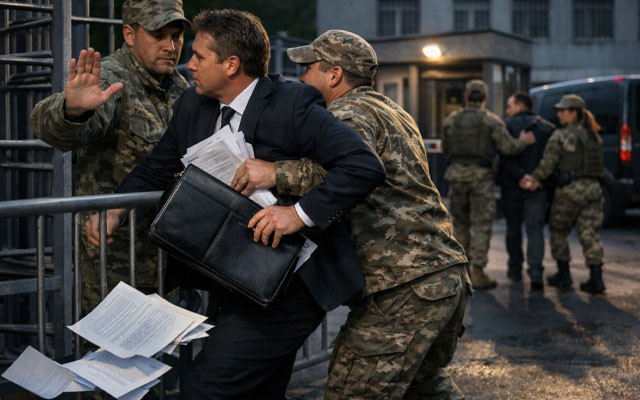
Guarantees of the practice of law
Proceedings opened following attack on advocate in Dnipro
The Committee for the protection of advocates' rights and guarantees of legal practice of the UNBA appealed to law enforcement agencies in connection with an advocate's report of an attack while performing his professional duties. The information was entered into the Unified Register of Pre-trial Investigations and a pre-trial investigation was initiated.
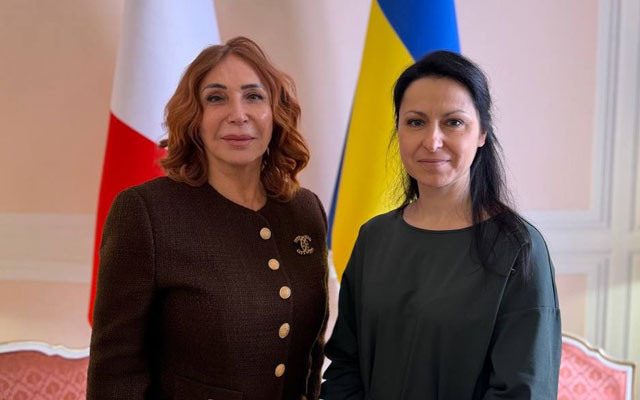
Abroad
The Ukrainian Embassy in Italy has provided information on the legal aspects of the Roadmap
On February 2, the President of the UNBA, BCU, Lidiya Izovitova, held a meeting with the Chargé d'Affaires of the Embassy of Ukraine in the Italian Republic Oksana Amjadin.
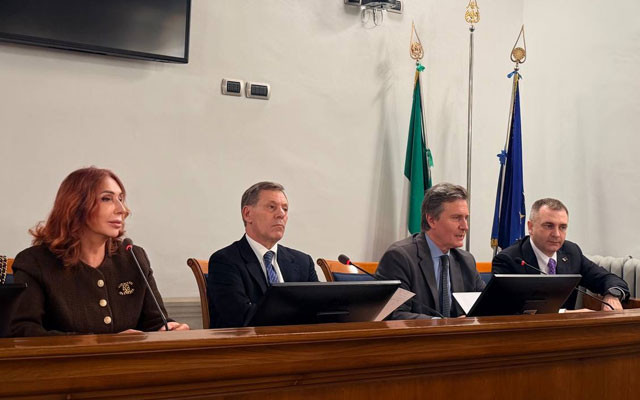
Interaction
«With us — to Europe»: Italian advocacy supports UNBA initiatives
On January 30, a meeting was held in Rome between a delegation from the Ukrainian National Bar Association and the National Bar Council of Italy (Consiglio Nazionale Forense, CNF) on the standards and practices of the legal profession and their significance for Ukraine's European integration process.
Publications

Volodymyr Matsko Extradition as a systemic form of rights violations

Victoria Yakusha, Law and Business The anti-corruption vertical cannot «take care» of the Bar as an institution, - acting head of the HQDCB

Censor.net Protecting advocates – protecting justice: addressing concerns about the new law

Ihor Kolesnykov A BRIEF SUMMARY REGARDING THE APPLICATION OF THE ORDER ON EXTENDED CONFISCATION IN LATVIA REGARDING FINANCIAL ASSETS OF…

Valentyn Gvozdiy WORKING IN A WAR ZONE

Lydia Izovitova Formula of perfection

Sergiy Vylkov Our judicial system is so built that courts do not trust advocates

Iryna Vasylyk Advocacy in the proclamation of Independence of Ukraine
